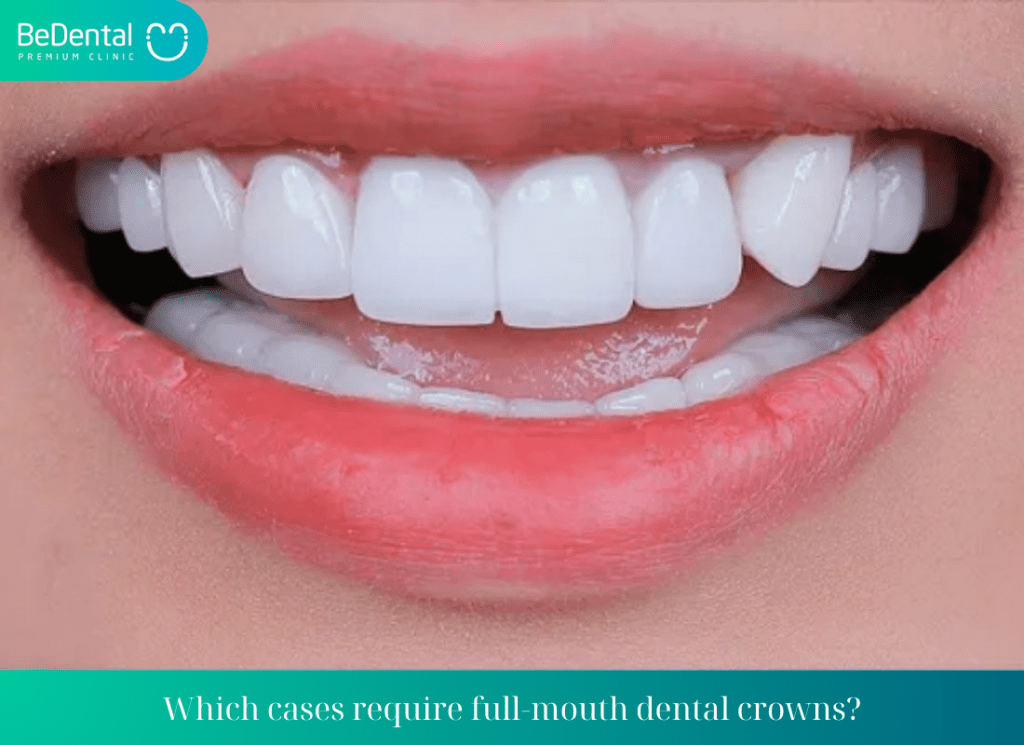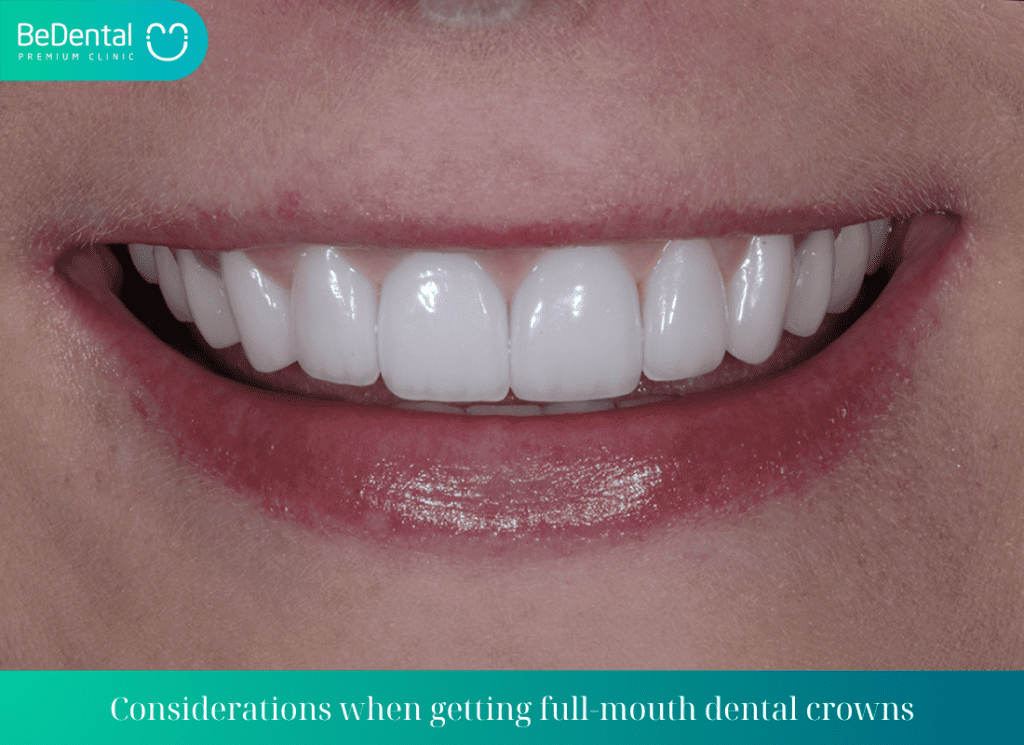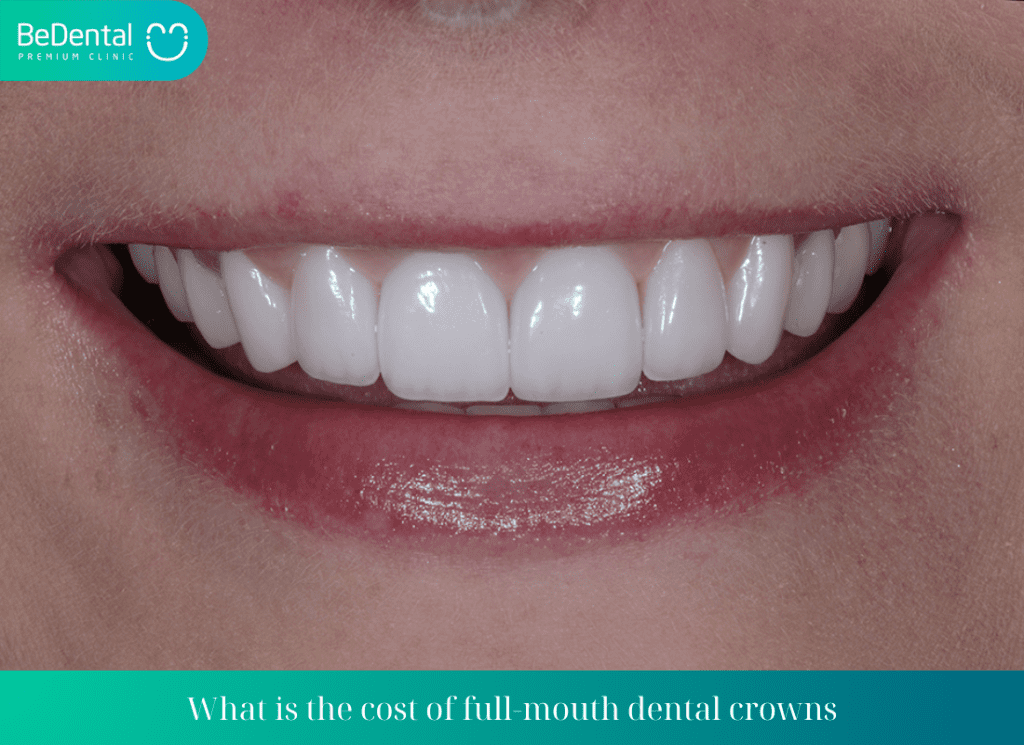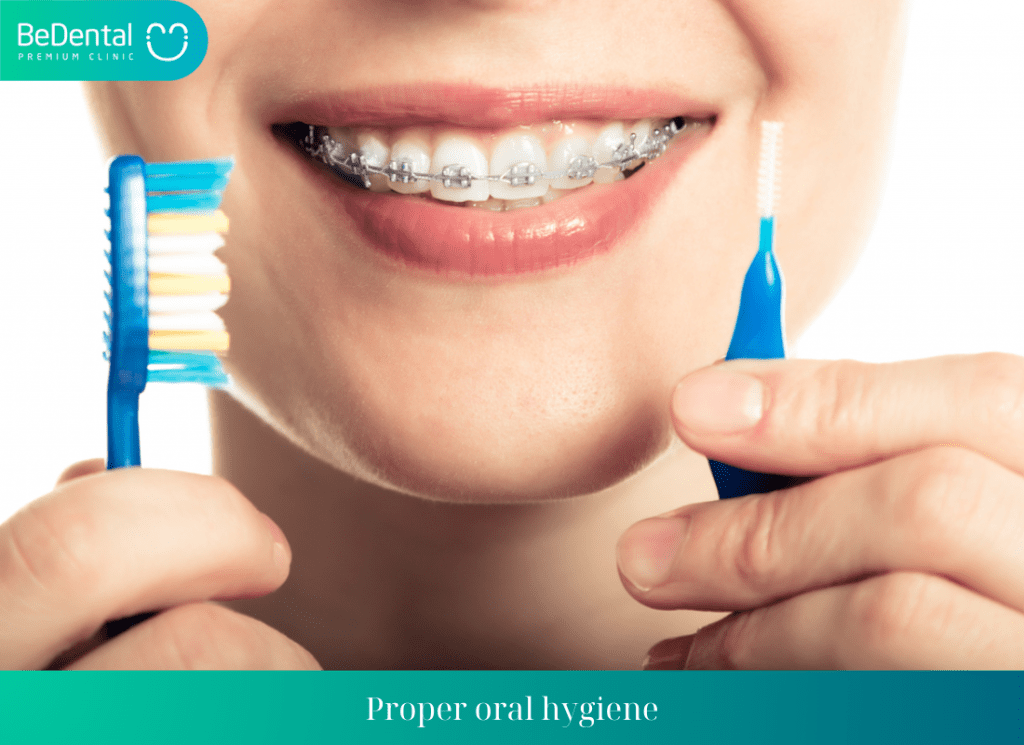Specific cases that may be suitable for full-mouth dental crowns or full-mouth porcelain crowns will depend on the individual’s dental condition and the dentist’s advice. So, What is the price of full-mouth dental crowns? Considerations when getting full-mouth dental crowns? Let’s find out with Bedental dental clinic through the article below!
Which cases require full-mouth dental crowns?
Which cases require full-mouth dental crowns? Currently, there is an increasingly popular trend of using cosmetic dental crowns to improve smiles. In particular, many people opt for full-mouth porcelain crowns to achieve optimal aesthetic results. However, as this process involves impacting natural teeth, not all cases are suitable.
The decision to have full-mouth porcelain crowns depends on the overall oral health and other conditions of the patient. Specifically, only when the conditions are met will the dentist decide to proceed with this procedure.
See more: Signs of exposed porcelain teeth

Below are some cases in which the use of full-mouth cosmetic dental crowns may be considered:
- Upper teeth are severely discolored or heavily stained, not responsive to whitening methods.
- Teeth are slightly crooked or spaced, and the patient prefers crowns over braces for time-saving.
- Teeth are too short or too long, causing a gummy smile.
- Teeth affected by decay, structural damage, requiring restoration.
The effects of full-mouth dental crowns
What are the effects of full-mouth dental crowns? Full-mouth porcelain crowns not only address dental issues but also improve chewing function and protect natural teeth.
Chewing function
The effectiveness in chewing has been demonstrated through practical studies, with porcelain crowns having high strength and durability, sometimes even surpassing natural teeth. By using full-mouth dental crowns, patients can comfortably enjoy various foods without worrying about sensitive or temperature-sensitive teeth.
The lifespan of porcelain crowns can reach 7-15 years, and with full porcelain crowns, it can extend up to 20 years.
Aesthetic benefits
In terms of aesthetics, dental crowns are designed to mimic natural color, shape, and texture, addressing issues such as yellowing, discoloration, or misalignment like crooked, spaced, or short teeth. With full-mouth dental crowns, the result is a uniformly colored, naturally beautiful set of teeth and the most radiant smile.
Additionally, full-mouth dental crowns can help prevent oral diseases and protect natural teeth, especially in cases of decay, fractures, or chips.
Considerations when getting full-mouth dental crowns
Here are some considerations to keep in mind when getting full-mouth dental crowns.

Which type of full-mouth dental crowns should be chosen?
When deciding to get full-mouth dental crowns, choosing the type of crowns is an important decision. There are two main types on the market: metal ceramic crowns and all-ceramic crowns.
Although metal ceramic crowns are usually more cost-effective, experts often recommend patients to choose all-ceramic crowns for their high aesthetics and durability. All-ceramic crowns not only provide better cosmetic results but also do not cause irritation and inflammation due to oxidation in the oral environment, which metal ceramic crowns can potentially cause.
On the market, there are different types of all-ceramic crowns such as Zirconia, DDBio HT, Cercon HT, Nacera Pearl, Veneer crowns… These types are carefully designed, have natural color and high durability. When used for full-mouth restoration, they improve not only aesthetics but also chewing ability.
Lifespan of dental crowns
Each type of dental crown has its own lifespan, with all-ceramic crowns usually having a longer lifespan compared to metal ceramic crowns.
If patients maintain proper oral care and regularly visit the dentist, they can extend the lifespan of dental crowns from 10 to 20 years. However, the lifespan of dental crowns also depends on other factors such as the initial condition of the teeth before crowning, the skills of the dentist, and the craftsmanship of the dental crowns.
Potential risks
Getting dental crowns requires the process of grinding the teeth, causing damage to the structure of natural teeth to a certain extent. Especially in the case of full-mouth crowns, grinding multiple teeth in a row can weaken the teeth and increase the risk of oral diseases.
Having dental crowns done at low-quality dental facilities can increase the risk of damage to natural teeth.
See more: Can a broken denture be repaired?
Choosing a reputable dental clinic
The most important thing for patients to consider when getting full-mouth dental crowns is choosing a reputable dental clinic.
Patients should research and choose a dental clinic licensed by the Department of Health and with all the professional certificates of the dental team. The clinic should have modern facilities and equipment that meet health standards.
The dental team should be experienced experts with extensive knowledge in this field. The consultation team should be enthusiastic and capable of answering all patient queries clearly.
What is the price of full-mouth dental crowns?
The price of full-mouth dental crowns at Bedental Dental Clinic depends on the number of teeth that need crowning and the type of dental crowns you choose. For the process of crowning all teeth, we recommend choosing all-ceramic crowns for better results. The cost for all-ceramic crowns typically ranges from 4,500,000 to 14,000,000 Vietnamese Dong per tooth. In contrast, metal ceramic crowns usually range from 1,000,000 to 3,500,000 Vietnamese Dong per tooth.

The information provided by Bedental gives you an overview of the cost of full-mouth dental crowns, including both metal ceramic and all-ceramic crowns. However, it is important to note that using cheaper types of dental crowns may pose risks in terms of quality and the source of materials, which could lead to oral health issues such as bad breath, gum inflammation, root decay, and aesthetic problems.
Therefore, when choosing the type of dental crowns, it is crucial to focus on the quality and reputation of the dental clinic and the materials used to ensure safety and effectiveness for your oral health.
Most asked questions
Are there any specific oral care instructions or precautions to follow after getting full-mouth dental crowns?
After getting full-mouth dental crowns, it is essential to follow specific oral care instructions and precautions to ensure the longevity and health of the crowns. Here are some tips:

- Maintain Good Oral Hygiene: Brush your teeth at least twice a day and floss daily to remove plaque and food particles that can accumulate around the dental crowns.
- Use a Soft-Bristled Toothbrush: Opt for a soft-bristled toothbrush to avoid damaging the dental crowns or the surrounding teeth.
- Avoid Hard Foods: Be cautious when eating hard or sticky foods that can potentially damage the dental crowns. Try to avoid chewing on ice, hard candies, or using your teeth to open packages.
- Regular Dental Check-ups: Visit your dentist for regular check-ups and professional cleanings to monitor the condition of your dental crowns and ensure they are functioning correctly.
- Protect Against Teeth Grinding: If you have a habit of grinding your teeth (bruxism), consider using a night guard to protect your dental crowns while you sleep.
- Avoid Harmful Habits: Refrain from activities like nail-biting, chewing on pens, or using your teeth as tools to prevent unnecessary stress on the dental crowns.
- Be Mindful of Oral Health Changes: Monitor any changes in your oral health, such as sensitivity, pain, or swelling around the dental crowns, and promptly inform your dentist if you notice any issues.
- Professional Cleaning: Schedule regular professional cleanings to maintain the health of your gums and prevent any complications that may affect the dental crowns.
See more: What is tooth filling?
By following these oral care instructions and precautions, you can help protect your full-mouth dental crowns and maintain a healthy and beautiful smile.
How can patients extend this lifespan?
Patients can take several steps to extend the lifespan of their dental crowns and maintain their oral health. Here are some tips to help prolong the longevity of dental crowns:
- Practice Good Oral Hygiene: Brushing teeth at least twice a day and flossing daily helps prevent plaque buildup and maintain the health of the teeth and gums, which can indirectly impact the longevity of dental crowns.
- Use a Soft-Bristled Toothbrush: Opt for a soft-bristled toothbrush to avoid damaging the dental crowns or causing gum irritation.
- Avoid Hard Foods: Be cautious when consuming hard or sticky foods that can potentially damage the dental crowns. Avoid chewing on ice, hard candies, or using teeth as tools.
- Regular Dental Check-ups: Visit the dentist for regular check-ups and professional cleanings to monitor the condition of the dental crowns and address any issues early on.
- Protect Against Teeth Grinding: If you grind your teeth (bruxism), consider using a night guard to protect the dental crowns from excessive force.
- Avoid Harmful Habits: Refrain from habits like nail-biting, chewing on pens, or using teeth as tools to prevent unnecessary stress on the dental crowns.
- Dietary Considerations: Limit sugary and acidic foods and beverages that can contribute to decay and erosion, which can compromise the dental crowns.
- Promptly Address Issues: If you experience any sensitivity, pain, or signs of damage to the dental crowns, seek dental care promptly to address the problem before it worsens.
- Maintain Regular Cleanings: Professional cleanings help remove plaque and tartar buildup that can affect the longevity of dental crowns and overall oral health.
By following these tips and maintaining good oral care practices, patients can help prolong the lifespan of their dental crowns and enjoy the benefits of a healthy and functional smile for years to come.
Conclusion
In conclusion, the decision to get full-mouth dental crowns is significant, and choosing the right type of crowns is crucial for both aesthetic and functional purposes. While all-ceramic crowns are often recommended for their high aesthetics and durability, it is essential to consider the quality and reputation of the dental clinic and the materials used to ensure the safety and effectiveness of the dental procedure.
Cheaper options may carry risks related to quality and material source, potentially leading to oral health issues. Therefore, prioritizing quality and seeking reputable dental facilities is key to achieving optimal results and maintaining good oral health.
Tư vấn chuyên môn bài viết:
BÁC SĨ DƯƠNG THỊ THÙY NGA





